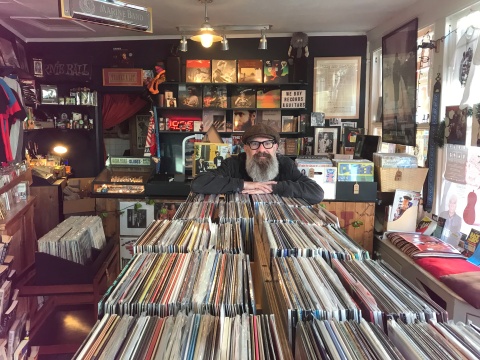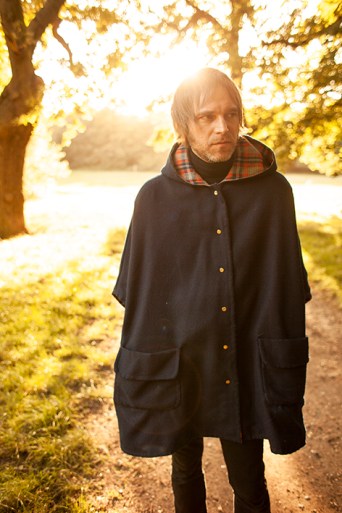
For his debut solo album, Richard Olson & The Familiars, the frontman of London’s cosmic country kings, The Hanging Stars, and former member of The See See and The Eighteenth Day of May, has let his freak flag fly, with stunning results.
It’s a wonderfully eclectic and inventive record, opening with the spacey, Primal Scream-style psychedelic dub of I Can’t Help Myself, before movin’ on up to the irresistible and breezy, orch-pop of Fall Into My Hands, taking a detour into the English countryside for the gorgeous ‘60s and ‘70s pastoral folk of Down Looking Up, heading to a Swedish forest for the Lee Hazlewood twilight croon of A Thousand Violins and then moving into krautrock territory for the hypnotic Little Heart.
Elsewhere there’s a Spacemen 3-inspired cover version of Air by Brit-folk-psych outfit The Incredible String Band, a homage to the garage-rock of early Brian Jonestown Massacre records (I’m A Butterfly), a Velvet Underground-esque spoken word piece (Rain) and the haunting, psychedelic folk lullaby Inside Sunshine.
“I had a bunch of songs and I didn’t know what I wanted to do with them, so I was like it, ‘Fuck it – I’m just going to make a record!’ the Swedish-born singer-songwriter tells Say It With Garage Flowers. “The rules were completely thrown out of the window – that was fun.”
Q&A
How did the idea for the solo album come about?
Richard Olson: Firstly, I had a bunch of songs that didn’t fit with any of the projects I was doing and, secondly, it was very much a product of the pandemic.
For me personally, it was a huge step to test my confidence because I’ve always been surrounded by incredible musicians: Pat Ralla, Pete Greenwood, Paulie Cobra, Sam Ferman, Joe Harvey-Whyte… I was like, ‘fucking hell – can I do it?’
I’m a drummer – that’s my first instrument. When I was about eight, I asked my mum, ‘Can I please learn to play the drums?’ I pissed myself in the first lesson because I was so scared and I couldn’t ask the drum teacher where the toilet was. You’re welcome to write that.
One of the really key things about playing these songs that I didn’t feel fitted in anywhere was that I kind of got to know the bass guitar a little bit and realised that it is the king of all instruments.
Is that why you open the record with I Can’t Help Myself, which has a killer dub bassline on it?
RO: I came up with that bassline and I was like ‘fucking hell!’ Everything sits so well around it.
Are most of the songs on the album new?
RO: Most of them. It all started with A Thousand Violins…
Which you wrote in a forest in Sweden…
RO: Yeah – I was on a little hill, overlooking a lake, and I had two chords that I was very pleased with. I had this idea that if I was ever going to do something on my own, I wanted to do some of it in a crooner vibe. I’m not getting any younger and I can get away with crooning – we all hope for Las Vegas eventually, right?
Were you channelling Lee Hazlewood and Richard Hawley?
RO: Yeah – and Serge Gainsbourg. I really wanted to sing A Thousand Violins in Swedish.
‘I got to know the bass guitar a little bit and realised that it is the king of all instruments’
You were born in Sweden, weren’t you?
RO: Yeah – I came here [the UK] when I was 21/22. I’m from the very south of Sweden – it’s a plain, which is very near Denmark. The forest line hasn’t quite started yet – it’s four hours away, and Stockholm is eight.
Malmö is Sweden’s third largest city – it has a little sister city, which is very full of itself, called Lund, which is where I grew up. It’s famous for its university and its 1000-year-old cathedral. It was a great place to grow up.
My mum was a single mum – she was a nurse. I grew up in a big, grey tower block with a lovely park. It was her just her and I – I got to know my father a little bit later in life. He was in a band with Björn from ABBA in the ‘60s – they were very famous in Sweden. I haven’t got a bad word to say about him – he was a great guy to drink a gin and tonic with.
My mum died when I was 19/20 – that was quite central to a lot of my career. It shook my whole world and I had a lot of ‘pillows’ that eased my pain – there were some good people around me. I had a few lost years and, speaking to you now, I feel that a lot of my career is trying to make up for that. That’s why I keep on hunting.
‘I wanted to do some of the album in a crooner vibe – we all hope for Las Vegas eventually, right?’
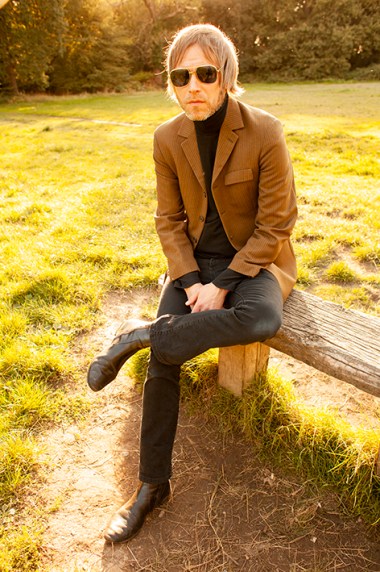 On A Thousand Violins you sing about losing your way. Is that a reference to that time in your life?
On A Thousand Violins you sing about losing your way. Is that a reference to that time in your life?
RO: So much of it is – you never get over a thing like that, but you learn to live with it. At the same time, you don’t want the pain to go away…
I can remember asking my mother on her deathbed: ‘What am I going to do?’ She said: ‘There will be a scar but you’ll learn to live with it and you’ll never want to get rid of it.’
My mother’s death taught me so much – once I got out the other side. That’s why I’m so driven and on it.
Have you been wanting to make a solo record for a long time?
RO: No. I had a bunch of songs and I didn’t know what I wanted to do with them – it wasn’t how I wanted The Hanging Stars or The See See to be. I was like it, ‘Fuck it – I’m just going to make a record.’
‘I’m trying to make a £2,000 record sound like a £200,000 one’
So, you went into the studio with Sean Read, who produced the last Hanging Stars album…
RO: We go way back – he’s such a brilliant guy and he’s become better and better at what he does. He was the perfect guy to speak to when I was challenging my confidence and myself.
I like his brass and piano on the record, and there are some great string arrangements by Herman Ringer of the Buenos Aires Symphony Orchestra too…
RO: Herman got in touch with The Hanging Stars and said ‘If you ever need anything…’ He was mind-blowing – he did three-part string arrangements at home that sound absolutely massive.
It’s incredible and it added to the wildness of the whole idea – I’m trying to make a £2,000 record sound like a £200,000 one. That’s a good quote!
Fall Into My Hands has some great strings on it and is a breezy pop song…
RO: Yeah – exactly. It was one of those songs that wrote itself – as a lot of people tend to say.
You pulled in a few friends to help you make the album, like Pat Ralla, Paulie Cobra and Joe Harvey-Whyte from The Hanging Stars, Jack Sharp (Large Plants), Dan Davies (Wolf People), Jem Doulton (Thurston Moore), Cecilia Fage (Cobalt Chapel)…
RO: And Duncan Menzies, who is an incredible fiddle player, and Ben Phillipson, from The Eighteenth Day of May – he’s a key person in my musical development.
I know you’re really into ‘60s and ‘70s British folk music. Down Looking Up, which is a lovely song, has that feel…
RO: Thank you – I did a demo of that for the third Hanging Stars album but it never quite sat the way I wanted it to. We reworked it with Sean on piano.
It reminds me of Nick Drake’s Bryter Later…
RO: Yeah, yeah. It’s got that vibe. It’s a funny song as well. I think I wrote the lyrics when I was touring and playing with Joel Gion’s band – the old Brian Jonestown guard. There were quite a lot of late nights and long drives. It’s a tale of drunkenness and cruelty.
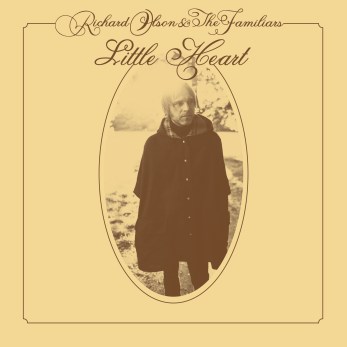 Little Heart is the lead track on the EP that’s coming out ahead of the album. Why did you choose that song?
Little Heart is the lead track on the EP that’s coming out ahead of the album. Why did you choose that song?
RO: Fall Into My Hands was the obvious pop choice – during recording it was known as ‘the Lenny Kravitz song’ – but I wanted to make it clear that this is a different record. It’s a more challenging album than that song.
Little Heart was inspired by something your son said, wasn’t it?
RO: Yeah – kids say some really magical shit. He kept saying ‘Little heart’ and I thought it was a such a beautiful thing.
It’s a one-chord song, isn’t it?
RO: Pretty much.
And it sounds a bit krautrock…
RO: I asked Jem, the drummer, to keep the Klaus Dinger [Neu!] beat down and built on top of that. That’s what’s so fun – there are a thousand pop songs in a chord.
Has your son heard the song?
RO: Yeah – he got bored pretty quickly.
You’ve covered Air by The Incredible String Band on the album and on the EP. The version on the album is quite Spacemen 3-like, but the one on the EP is a country take on it…
RO: I didn’t know how to get the song across – I got absolutely obsessed with their version of it. I’m a huge Incredible String Band fan – I know they can seem a bit twee, but once you scratch the surface there’s some incredible songwriting.
That song is so evocative and the essence of how good they are. I’m not sure I did it any justice but I did send it to Mike Heron [from The Incredible String Band]. After a couple of months, someone got in touch and said he absolutely loved it. That was really nice.
‘I’m a huge Incredible String Band fan – I know they can seem a bit twee, but once you scratch the surface there’s some incredible songwriting’
The album track I’m A Butterfly sounds to me like it could’ve been a Hanging Stars song. It’s a bit country-garage rock…
RO: It’s more garage rock and maybe it could’ve been on one of the last See See records. That was the one that I was most worried about fitting in if I’m honest, but then we put a weird recorder on it that goes all the way through it. It’s a bit of a homage to the Brian Jonestown Massacre – they have that weird recorder vibe on a few of their early records.
Christof Certik [from the Brian Jonestown Massacre] actually does a spoken word part on it…
RO: That was really funny – I kept on saying to him: ‘Can you send me a voice message of you saying ‘I’ve seen the light in all its might and it is something to behold?’ He kept saying, ‘I don’t know how to say it’, so I said to him, ‘OK – you’re an 18-year-old surfer and your mum has just told you off for not doing the dishes,’ or ‘You’re a Hollywood cowboy…’ In the end, I said, ‘You’re a wannabe beatnik in 1959, but you’ve got it a bit wrong’. That was the one we ended up with.
Is that song autobiographical? In the lyric you sing about going to school, bumming around and getting a job…
RO: Without sounding too pretentious or dramatic, it’s about being who we all are – us and the people who go to our shows. We’re butterflies – we’re colourful, we look silly but, ultimately, we look beautiful. That’s what I think – that’s why those people are my people. But people don’t always see it that way. It’s slightly putting the boot in at all the people who tell you’re a prick and that you should grow up. Hence, ‘I’ve seen the light in all its might and it is something to behold.’
Your wife, Lucy Evans, does the spoken word part on Rain, which you recorded at home during the lockdown summer of 2020…
RO: The rain is real – it might’ve been when Walthamstow got flooded. The beat is off an iPhone app with all these classic drum machines on it – most of the vocals and the guitars were done at home, but then Sean mixed it. In some ways I wish I’d done it all at Sean’s to make it more ‘hi-fi’, but, you know, it’s all part of the journey.
‘With this record the rules were completely thrown out of the window – that was fun’
Paulie Cobra sings the harmonies on it…
RO: He did an incredible job – when he sent it back to me, I was like, ‘What the fuck?’
He sounds like Dennis Wilson…
RO: I know – that’s exactly what it is. He completely created it.
Was the song inspired by Spiritualized?
RO: You’re the second person to say that. I was trying to go for more of a Velvet Underground thing.
Ben Phillipson from The Eighteenth Day of May plays guitar on the last song, Inside Sunshine…
RO: Yeah – he does. That song is very dear to my heart because I feel like it is a bit Eighteenth Day of May – it’s very much what him and I conjure up with that band. I’m so pleased with that song – it’s got all the elements.
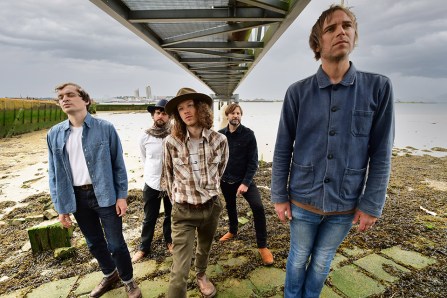
Do you think this record will surprise people?
RO: To be honest, The Hanging Stars is my main thing, but it’s not the ‘60s, ‘70s’, ‘80s or ‘90s anymore, and you can’t just say, ‘We’ve really got into Kraftwerk and we’re going to make a Kraftwerk-country record…’
We have to play within our field, but with this record the rules were completely thrown out of the window, which was quite freeing – that was fun. I would’ve spent a lot more time and money on it if I had it, but it came together the way it did because there was no money and there was no time.
I also have to celebrate the community – it’s so easy to slag London and scenes off, but we’re all very lucky. I’m surrounded by some brilliant musicians – London is full of them – and, in our little corner, it means something to us.
I wish I could’ve celebrated it more and got a lot of my friends from America on it, but it was just after the pandemic and people weren’t travelling.
Are you pleased with the album?
RO: I am, but I won’t know how I feel until I get the vinyl in my hand. I’m still learning how to walk and I feel rather self-conscious promoting my own name, as much as I am. At the same time, it’s just a work of art – something that I’ve conjured up. I’m trying to project an emotion and a dream onto you. When I get over myself, that’s all it is, and I feel like I’ve done quite a decent job.
This record came to me a lot more naturally than I expected it to. I’m not trying to be anything – well, I’m trying to be funny from time to time with some of the lyrics – but it’s quite an unassuming record and I’m kind of happy with that. And do you know what? They’ll probably be another one.
What would you say to people who aren’t, er, familiar with your or your music?
RO: I would say there’s a little something for everyone. There’s Air for the ‘Heads, and you’ve got Fall Into My Hands if you like Lenny Kravitz.
Richard Olson & The Familiars, the debut solo album by Richard Olson, is released on vinyl on April 7. It’s available to preorder here (Cardinal Fuzz).
The digital version will be out on March 31, preceded by the Little Heart EP on March 24.
Richard Olson & The Familiars are playing a one-off show at The Waiting Room, London on April 27. Tickets are available here.
